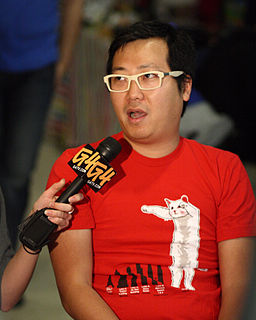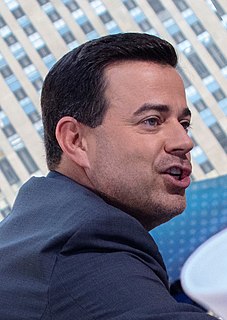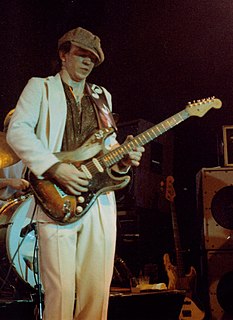A Quote by Joe Scarborough
This is all about a media war that continues to rage between the old and new media. Unfortunately for our soldiers, these brave Americans are caught in the crossfire.
Related Quotes
The arrival of television established a mass-media order that dominated the last 50 years. This is a personal media revolution. The distinction between the old order and the new order is very important. Television delivered the world to our living room. In the old media, all we could do was press our noses against the glass and watch.
I've talked about how the future of journalism will be a hybrid future where traditional media players embrace the ways of new media (including transparency, interactivity, and immediacy) and new media companies adopt the best practices of old media (including fairness, accuracy, and high-impact investigative journalism).
From American Idol to The Matrix participatory media - where old and new media converge by involving fans - is influencing our culture by creating new forms of interactive storytelling. Yet by enabling people to participate in such various media they can converge as a crowd to alter the story to create new modes of engagement, some not necessarily endorsed by the creator - or the brands that back them.
Thinking about free speech brought me to media regulation, as Americans access so much of their political and cultural speech through mass media. That led me to work on the FCC's media ownership rules beginning in 2005 to fight media consolidation, working with those at Georgetown's IPR, Media Access Project, Free Press, and others.
Working with lots of old media clients, I've had a front-row seat on the ascension of new social players and the decline of traditional news outlets. And it's clear to me that old media has an awful lot to learn from social media, in particular in five key areas: relevance, distribution, velocity, monetization, and user experience.
I have learned one thing, because I get treated very unfairly, that's what I call it, the fake media. And the fake media is not all of the media. You know some tried to say that the fake media was all the media, no. Sometimes they're fake, but the fake media is only some of the media. It bears no relationship to the truth.
If old consumers were assumed to be passive, then new consumers are active. If old consumers were predictable and stayed where you told them, then new consumers are migratory, showing a declining loyalty to networks or media. If old consumers were isolated individuals, then new consumers are more socially connected. If the work of media consumers was once silent and invisible, then new consumers are now noisy and public.
Day by day night after night Blinded by the neon lights Hurry here, hustlin' there No one's got the time to spare Money's tight, nothin' free Won't somebody come and rescue me? I am stranded, caught in the crossfire Stranded, caught in the crossfire! Tooth for tooth, eye for an eye Sell your soul just to buy, buy, buy Beggin' a dollar stealin' a dime Come on can't you see that I I am stranded, caught in the crossfire
































